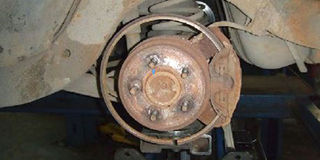Prime
Understanding brake fade and how to prevent it

Because brake fade occurs when the brake pads are overheated, the phenomenon is only temporary and braking performance usually returns once the brakes have cooled down. NET PHOTO
What you need to know:
- Brake fade is when your brake pedal feels like it is working, but your car does not stop. In some case, it can happen even if your vehicle’s brakes are new and the entire braking system is in good working condition.
Technically, brake fade is when you lose the effect of braking your car even when you have all car brake system components. It is a problem you experience when you step on the brake pedal. Components of the brake system include brake pads and the brake rotor, commonly known as the brake disc which does the actual braking of the car. But what actually causes brake fade?
According to Alvin Jerry Nkini, a mechanic at Dalas Auto Limited in Bunga, brake fade is caused by your uncontrolled need to drive fast and a combination of other factors, all of which are due to human error.
Poor quality brake parts
First, the main simple factor is the quality of the brake rotor and brake pads you use. Nkini explains that if these two components are of poor quality, there will obviously be heat production that will lead to brake fade.
“If the brake pads and rotor are not designed to stand friction due to poor quality, they will produce heat. When the heat goes up and becomes unbearable to the rotor and brake pads, it causes a slippery effect between them and brake fade will occur,” Nkini says.
Identifying poor quality pads
Nkini says it is easy to identify poor quality brake pads from better ones. It could be from the brand or the manufacturer. For the brake rotor, some are solid and others are ventilated, as well as those with grooves.
Manufacturers design rotors understanding their functionality. For instance, when they are made of grooves, it means the car requires friction to stop and when they are manufactured with holes for ventilation, it means rotors will cool themselves down to prevent heating. If you swap a ventilated grooved rotor for a solid one because it is cheap, it will lead to brake fade.
“Physically, poor quality brake pads, besides branding and the manufacturer, is that they normally produce black dust that coats and spoils the rim. They also produce a squeaking sound, say after a week or two from the onset of replacement, yet the best brake pads have a metal layer that normally warns you before completely wearing out to spoil the rotor,” Nkini adds.
Carrying out modifications on the car
Some of you carry out modifications on a car to meet your performance demands immediately you acquire one. These may include engine performance to give the car more power by increasing its air intake and the combustion chamber.
“If you decide to twist or modify the performance of the car in terms of its movement and you do not modify its braking system to match its performance, you will have the right initial braking system working against the more powerful modifications you carried out. The car moves faster than it should,” explains Peter Amadi, a mechanic.
Amadi adds that this happens even if you have the right brake pads and rotor but carried out modifications. During the designing process, the manufacturer puts all these factors in consideration. The same thing happens to the load the car carries. If you load yours with more than what it is meant to carry, it will have a high momentum. Because of this momentum, the brakes fail to stop or control the car since you need a lot of friction to stop.
Driving habits
Nkini says brake systems are designed to be used according to normal usage. For instance, from home to work. Nkini says the problem arises when you get that same car with the normal braking system and you drift or race.
“When you subject the car to a driving experience it has not been used to such as rallying and the brake system was not designed for the kind of driving you are subjecting it to, it will lead to brake fade,” he says, adding that brake fade will affect all car brands the same way.
Preventing brake fade
To avoid brake fade, put in mind the manufacturer’s design factors. For instance, if your vehicle was manufactured with ventilated rotors, do not replace them with solid ones since this will compromise your braking efficiency.
What to do in case of brake fade
If you find yourself going down a long steep hill and your brakes start feeling spongy or the pedal is getting hard, downshift into a lower gear. This will cause your engine and drive-train to slow by themselves and that will take some of the strain off the brakes.
Then you need to try and slow the vehicle to a stop and get off the road. When the brakes get this hot, they need to cool down for a long period of time. Once you get to the side of the road you need to let your brakes cool for at least an hour.
Do not touch the wheels, lug nuts or any part of the brakes since they will be hot enough to easily burn you. After cooling down, resume driving in the lowest gear first and slowly accelerate your vehicle to the desired speed.
www.myautorepairadvice.com




